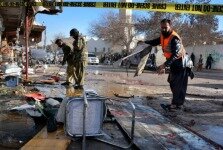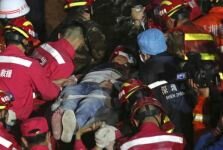
Yemenis search for survivors under the rubble of houses destroyed by an overnight Saudi-led airstrike in Yemen’s capital, San’a, on Friday. The coalition has used cluster munitions supplied by the U.S., according to Human Rights Watch.
BEIRUT—The Saudi-led coalition carrying out airstrikes in Yemen has dropped cluster bombs made and supplied by the U.S. near villages in the north of the country, Human Rights Watch said on Sunday.
A report released by the New York-based rights monitor said the weapons were dropped from coalition fighter jets targeting military installations and other points around the villages held by Iran-backed Houthi rebels in Yemen.
Cluster munitions were banned in a treaty signed by 116 countries for the high civilian casualty tolls they can inflict. Often they don’t detonate on impact, leaving behind explosives that can maim and kill civilians.
The U.S., Saudi Arabia and its coalition partners have not signed the treaty, although U.S. policy bars exporting the bombs to countries that use them in civilian areas.
Col. Steve Warren, chief Pentagon spokesman, said the defense department was looking into the report and called upon all sides to “comply with international humanitarian law, including the obligation to take all feasible measures to minimize harm to civilians.”
In its report, Human Rights Watch said that what it called credible video and photo evidence, coupled with satellite imagery, indicated that the munitions were dropped near villages in northern Saada province, the seat of Houthi power. The conclusion of the report hasn’t been independently confirmed.
In Yemen, they “have been hitting areas near villages, putting local people in danger,” saidSteve Goose, arms director at Human Rights Watch. “Saudi Arabia and other coalition members—and the supplier, the U.S.—are flouting the global standard that rejects cluster munitions because of their long-term threat to civilians.”
Saudi officials didn’t respond to a request for comment. At a March news conference, Saudi coalition spokesman Brig. Gen. Ahmed bin Hasan Asiri denied that the coalition was using cluster bombs.
He said Saudi Arabia was conducting up to 70% of the airstrikes, with the United Arab Emirates contributing the bulk of the rest. Emirati officials also didn’t respond to a request for comment.
The World Health Organization says that airstrikes and fighting between Houthi and pro-government forces has made aid deliveries difficult. At least 1,244 people have died and an additional 5,044 were injured since March 19, the WHO said.

International aid groups have said the toll could be much higher, but that fighting has limited their ability to gather information.
Riyadh announced formation of a military coalition on March 26 after Houthi rebels ousted Yemeni President Abed Rabbo Mansour Hadi—a Saudi ally—forcing him into exile.
The kingdom controls Yemen’s skies and monitors its shores in a naval and aerial campaign to which the U.S. has contributed weapons, logistics and intelligence. Saudi Arabia says the goal of its campaign is to stop the Houthis’ advance and reinstall Mr. Hadi’s government.





